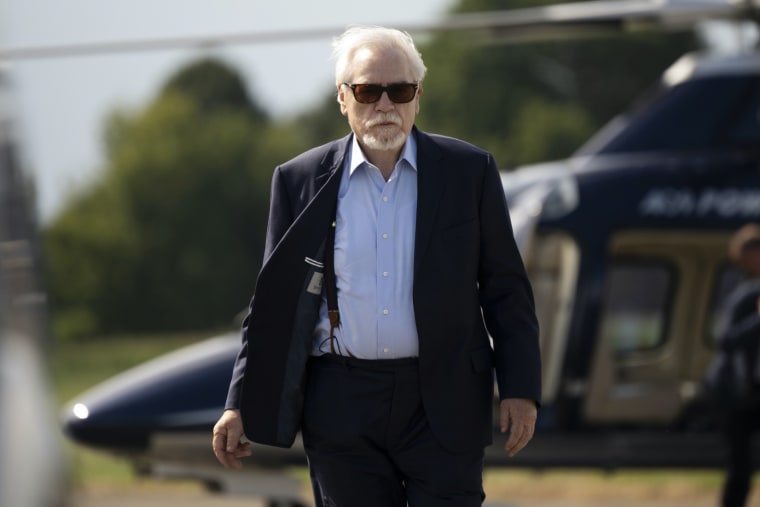After a two-year gap, HBO’s onetime sleeper hit “Succession” finally debuts its pandemic-delayed third season on Sunday. Like the show itself, which depicts a world of print and television media desperately trying to maintain its dominance, the show returns to a TV landscape that has been radically altered since it was last on the air. The political landscape has also changed, making the series’ commentary on Trump-era excesses feel a little less relevant. But though “Succession” may be a bit of a dinosaur, there’s lots of roar left in the old girl yet.
Though “Succession” may be a bit of a dinosaur, there’s lots of roar left in the old girl yet.
The best part of “Succession” has always been right there in the name. It's the story of the billionaire Roy family, and the struggle over who will inherit the patriarch’s glitzy but struggling media conglomerate. Ever since the show’s first season, when Waystar Royco CEO Logan Roy (Brian Cox) miraculously recovered from a stroke, the immediacy of the succession question has been backburnered for a slower musical chairs dynamic.
The first two seasons managed to be both a grimly gleeful black comedy about the ultra-rich and a more traditional drama about a feuding family. Logan spent Season 2 playing his children off of each other to see which of his progeny has the fire needed to run the company. That season also included congressional hearings for the show's running “cruise line” scandal (complete with sexual assault and probable murder), and plenty of palatial intrigue. But the actual question of who will lead Waystar remains unanswered, because as the series is all too aware, when you play the game of “Succession,” once someone wins the show dies.
But Season 2 ended with the succession crisis front and center once more, when heir apparent Kendall Roy (Jeremy Strong) refuses to take the fall for his father — and attempts to throw him under the bus. Season 3 picks up mere moments later, with Logan realizing the wolf is at the door. He needs someone else, and fast, to man the exits and help save his own hide.
Welcome to the Roy civil war, as Logan shamelessly dangles inheritance as repayment for loyalty. And everyone’s devotion is for sale, even if only three of the players are real contenders: daughter Shiv (Sarah Snook), youngest son Roman (Kieran Culkin), and non-family member general counsel Gerri Kellman (J. Smith-Cameron).
With Logan now once again weakened, the sharks circle, the offers come and go, and allegiances turn on a dime.
With Logan now once again weakened, the sharks circle, the offers come and go, and allegiances turn on a dime. The series takes great pleasure in mixing and matching different combinations of the ensemble to create varying configurations for Team Kendall vs. Team Logan, and exploring the assorted levels of bumbling incompetence that result. Despite the series utterly ignoring the pandemic (one of the few contemporary-set shows to refuse to acknowledge it at all), viewers at home are likely all too aware that the wealth gap has grown substantially larger since Season 2. That just makes the show’s takedowns of its out-of-touch protagonists all the more satisfying.
The show also makes a point of leaning into its Shakespearean overtones. Brian Cox first gained fame for his portrayal of King Lear, and one cannot help but draw direct comparisons between the two aging rulers. His Logan Roy is both man and monster, someone utterly consumed by the game of acquisitions and mergers, and who must appear to be winning at all times. As his direct competition, Jeremy Strong remains a worthy adversary. He is outwardly his father’s son — the opening episode setting up the family’s respective war rooms highlights how much both men mirror each other in a crisis. But Strong’s Kendall has a tragic flaw his father is missing: a soul. Not that this makes him a good person, but it does offer the possibility that he could become one. Sadly, every time it looks like he might grow a spine, he instead hacks off another piece and sells it to keep himself in the game.
It's that tragedy that keeps viewers hooked, despite “Succession’s” slow format. The Roy civil war slowly expands until entire financial markets are at stake, with each of Roy’s children given a moment to stand up to their father, to prove they are better people by walking away. But even as viewers hope for better, we know they will fail, as the pull of power, money and the illusion of influence maintain a vise-like grip over all of their lives. “Succession” may be from a different era, an old school HBO prestige series in a new school HBO Max world, but its story of flawed people in a mad dash for power will always be current.

